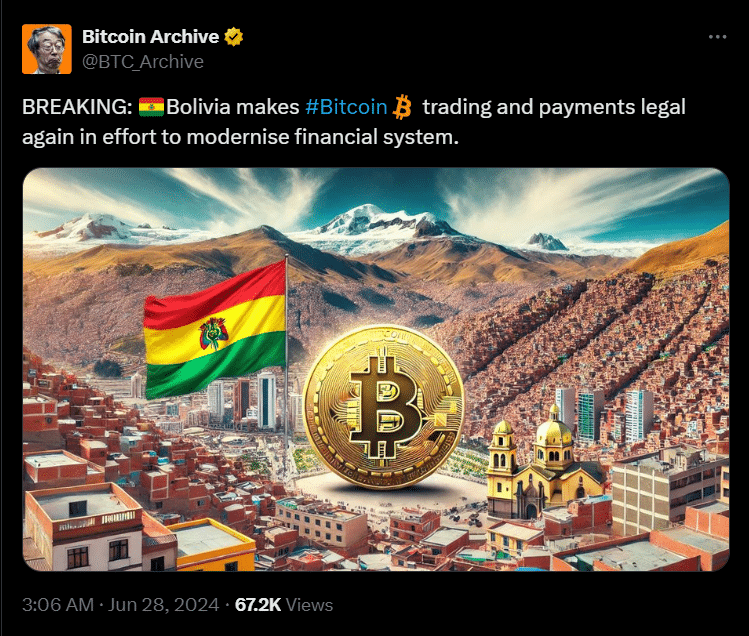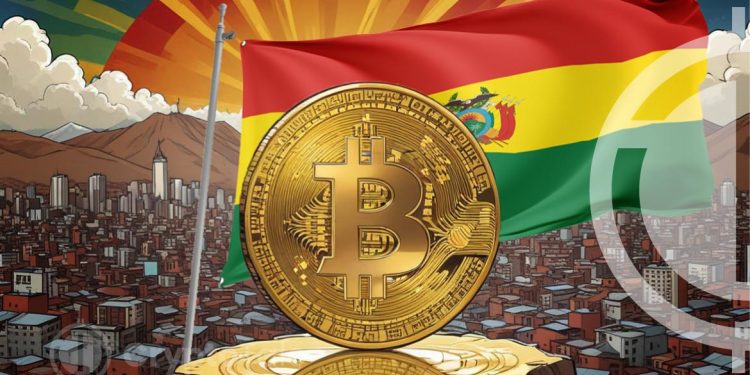- Bolivia legalizes Bitcoin trading and payments, reversing a 2020 ban to modernize its financial system.
- Central Bank of Bolivia can now conduct cryptocurrency transactions but not as legal tender.
- Bolivia plans to educate the public on cryptocurrency risks, integrating it into their financial education plan.
Bolivia has made a decision to reintroduce Bitcoin trading and payments as part of its efforts to modernize the financial system. This move signifies a major shift in the country’s stance on digital assets, following a long period of strict regulations and prohibitions. On June 26, the Central Bank of Bolivia (BCB) announced the lifting of the ban on Bitcoin and other cryptocurrencies, allowing banks to engage in transactions involving these digital assets.
This regulatory change reverses Board Resolution N°144/2020, which was implemented in December 2020. The BCB’s decision aligns Bolivia with the Latin American Financial Action Task Force (GAFILAT) recommendations, which advocate for the adaptation of financial systems to accommodate cryptocurrency transactions. This change has been made due to the interconnection of the Central Bank of Bolivia, the Financial Investigations Unit (UIF), and the Financial System Supervisory Authority (ASFI).

Despite the newfound ability to trade cryptocurrencies through authorized electronic means, the Central Bank of Bolivia has been clear in its communication that these digital assets are not considered legal tender. This means that while cryptocurrencies can be used for transactions, businesses are not obliged to accept them as payment. This distinction is crucial for maintaining transparency and managing public expectations regarding the legal status of cryptocurrencies in Bolivia.
The Central Bank has also announced plans to incorporate comprehensive information on the risks associated with cryptocurrencies into its Economic and Financial Education Plan. This initiative aims to educate the public on how to safely handle digital assets and understand the potential risks involved. By promoting informed and secure engagement with cryptocurrencies, the BCB seeks to mitigate the risks and ensure a well-informed population.
Historically, Bolivia has maintained a stringent stance on cryptocurrencies. In 2014, the Financial System Supervision Authority issued a resolution banning the use of cryptocurrencies due to concerns over consumer protection and potential money laundering activities. This ban was reinforced in 2022 when the Central Bank prohibited the banking sector from using, marketing, or transacting cryptocurrency assets to protect the public from various risks, fraud, and economic losses.
Global Bank Standard Chartered Ventures into Bitcoin and Ether TradingThis regulatory change occurs amidst a backdrop of political and economic turbulence in Bolivia. Recently, the country experienced a dramatic coup attempt led by rogue General Juan Jose Zuniga. The attempt was swiftly quelled, and Zuniga was arrested, highlighting the ongoing instability in the nation.
The legalization of Bitcoin trading and payments marks a significant milestone in Bolivia’s financial history. It represents a move towards embracing digital innovation while ensuring public awareness and safety. As Bolivia navigates these changes, the country’s financial landscape is set to undergo a transformative period, balancing the opportunities and risks associated with digital assets.











